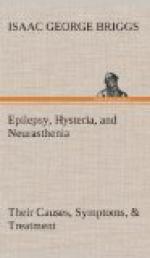2. Take any object in
your hand, and note its exact form, weight,
colour, etc.
3. Look in a shop-window
while you count ten, and as you walk on, try
to recall all the objects
therein exhibited.
4. Accustom yourself
to defining the sounds you hear, and concentrating
on a special one, as that
of a passing tram, or a ticking watch.
5. Make a rapid examination
several times daily of your feelings and
thoughts, and try to express
them definitely.
6. Concentrate on the
mental reproduction of a regular curve: a figure
8 placed on its side.
7. Listen to a metronome,
and, a friend having stopped it, mentally
repeat the ticking to time.
8. Whenever you handle
anything, try to retain the impression of that
object and its properties
for several minutes, to the exclusion of
other ideas.
9. Concentrate on ideas of calm, and of energy controlled.
10. Place three objects
on a sheet of white paper. Remove them one by
one, at the same time effacing
the impression of each one as it is
removed, until the mind, like
the paper, is blank.
11. Efface two of the objects, and retain the impression of one only.
12. Replace the impressions
in your mind, but not the objects on the
paper, one by one.
The object of these exercises is to get your wandering mind daily a little more under control; do not exhaust yourself.
After some months of treatment, ask yourself—
Am I able to walk ten miles with ease? when introduced to a stranger of either sex or any age, to converse agreeably, profitably and without embarrassment? to entertain visitors so that all enjoy themselves? to read essays or poetry with as much pleasure as a novel? to listen to a lecture, and be able afterwards to rehearse the main points? to be good company for myself on a rainy day? to submit to insult, injustice or petulance with dignity and patience, and to answer them wisely and calmly? When you are able to answer, “Yes!” to these queries, your nerves are sound.
* * * * *
CHAPTER X
FIRST STEPS TOWARDS HEALTH
“All sick people want
to get well, but rarely in the best way. A ’jolly
good fellow’ said:
‘Strike at the root of the disease, Doctor!’
And
smash went the whisky bottle
under the faithful physician’s cane.”
In neuropaths, all irritation to the nervous system is dangerous, and must be eliminated, and to this end, eyes, ears, nose and teeth, all in close touch with nerves and brain, must be put and kept in perfect order.
The Eye. Only 4 per cent, of people have perfect sight. Errors in refraction—common in neuropaths—mean that the unstable brain-cells are constantly irritated. Dodd corrected eye-errors in 52 epileptics, 36 of whom showed improvement.




